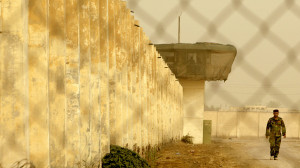Al-Qaeda has said it was responsible for two simultaneous prison breakouts in Iraq on Monday 22 July, claiming that as many as 500 inmates had been set free. The statement was posted on a militant website the following day.
The Islamic State of Iraq and the Levant, which was formed earlier this year through a merger between al-Qaeda’s affiliates in Syria and Iraq, said it had carried out the attacks on Abu Ghraib and Taji jails near Baghdad, having spent “months planning.”
Abu Ghraib had previously come to notoriety as a political torture centre under the Hussein regime, and, later, the site of numerous abuses of Iraqi detainees by the US military.
The attacks came exactly a year after the leader of al-Qaeda’s Iraqi branch, Abu Bakr al-Baghdadi, announced that freeing its imprisoned members would be its new top priority, through a campaign dubbed “Breaking the Walls.”
“In response to the call of the mujahid Sheikh Abu Bakr al-Baghdadi to seal the blessed plan of “Breaking the Walls”… the mujahideen brigades set off after months of preparation and planning to target two of the biggest prisons of the Safavid government,” read this week’s statement, “Safavid” being a derogatory term for Shi’ite Muslims used by hardline Sunnis, referring to a dynasty that ruled Iraq from the 16th to 18th centuries.
Sunni Islamist militants have in recent months been regaining momentum in their insurgency against Iraq’s Shi’ite-led government, which came to power after the US-led invasion.
The fighting at the jails began at night and endured for several hours. The situation was at last brought under control in the later hours of Monday morning with the intervention of a military helicopter.
“The attack against Taji jail alone was carried out by nine suicide bombers and three car bombs driven by suicide bombers,” Interior Minister Wissam al-Firaiji told reporters.
“The attackers also lobbed more than 100 mortar shells,” he added.
Iraqi authorities initially denied any prisoners had escaped in the assaults, but later admitted that “some” prisoners had escaped.









